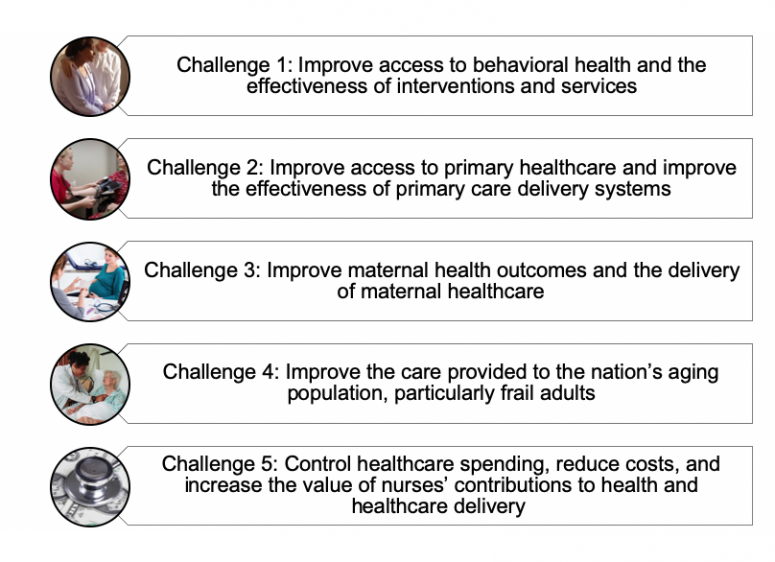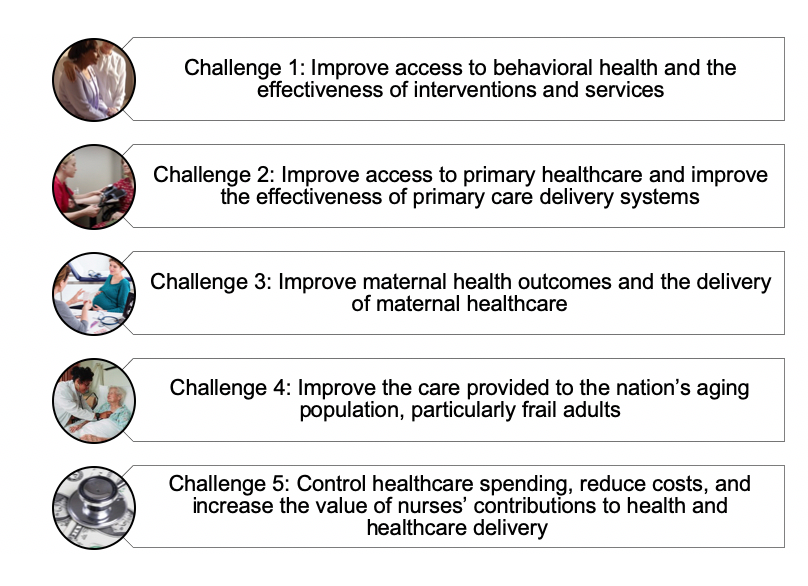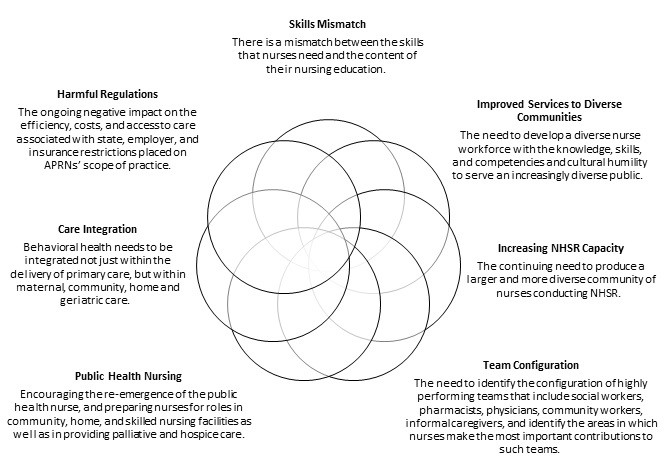
Over the past 20 years, the number of nurses conducting nursing health services research (NHSR) has grown significantly. The quality and rigor of this work is a reflection of the decades-long efforts of schools of nursing (e.g., Penn, UNC) with research programs focused on patient outcomes, the nursing workforce, quality of care, and costs to prepare nurse scientists for careers in NHSR. In the late 1990s, early pioneers of NHSR formed the Interdisciplinary Research Group on Nursing Issues (IRGNI) within AcademyHealth that has helped to grow the field and expand the interdisciplinary networks for established and emerging NHSR scientists. In spite of the strong history and growth of NHSR, there has been inadequate attention to developing and implementing a research agenda to guide researchers, graduate students, and post-docs.
In response, an interdisciplinary group of 38 NHSR scientists gathered in Bozeman, Montana in July 2019. The goal of the meeting was to discuss the five major challenges facing health care delivery (Figure 1) and to identify the most important and feasible research questions that need to be answered by NHSR over the next decade. Participants discussed the role of nurses in addressing each challenge and the opportunities and barriers faced in conducting research. During the 3-day meeting, the Nursing Health Services Research Agenda for the 2020s was developed. This blog post summarizes the key takeaways from that meeting.
The five key challenges facing health care delivery in the 2020s provided the structure for the meeting and highlighted areas where nursing and NHSR can make important contributions. The Planning Committee members identified the five challenges through a review of research agendas developed by public and private funders, health services research and policy associations, and health policy leaders. During each day, time was dedicated to each challenge for experts to provide overviews of the topics and review what is known and where the gaps in knowledge lie.

Figure 1: Five Challenges Facing Health Care Delivery in the 2020s.
Here, we provide some background on the five key challenges confronting health care delivery that motivated individual and group discussions:
- With increasing behavioral health concerns, including drug addiction, alcoholism, depression, and suicide, better use of advanced practice registered nurses (APRNs) and registered nurses (RNs) represent important opportunities to help improve access to and effectiveness of behavioral health care delivery.
- Demand for primary care services outpaces capacity and has led to recommendations for expanded roles for APRNs and RNs in primary care. Preparing nurses for careers in primary care has emerged as a national workforce priority and is important as care delivery evolves to incorporate more telehealth and new models of care that rely on diverse configurations of providers.
- Not only does the United States have high maternal and infant mortality rates compared to other industrialized nations, recent evidence shows that rates are increasing and stark racial disparities exist. Understanding the underlying causes is critical, and an agenda for NHSR on maternal and infant health care delivery is important for creating opportunities and partnerships to address the issue.
- Determining how to meet the increasingly complex health care needs of the growing and aging population, especially for those living in rural and underserved areas, will be a significant challenge for the health care delivery system and clinicians over the next decade. There is a gap in the preparedness and ability of nurses and the health workforce to meet the needs of this population.
- In the 2020s, efforts to improve patient outcomes and lower health care costs will accelerate. NHSR will need to examine innovations that increase our understanding of the value of nurses’ contributions.
As the conversations progressed at the meeting, repeated themes emerged. Eight “cross cutting issues” (Figure 2) highlight gaps, opportunities, and barriers facing nursing. The consideration and inclusion of these issues in NHSR will be critical to advancing the research and nursing practice over the next decade.

Figure 2: Cross Cutting Issues
One year later, the NHSR Agenda for the 2020s remains important and highly relevant. The World Health Organization declared 2020 the International Year of the Nurse and the Midwife, a global celebration of the work of nurses. However, no one could predict that nursing would be at the center of many of the health care discussions during this year-long celebration. Unforeseen, the COVID-19 pandemic has propelled nursing into the spotlight while disrupting both nursing practice and research. As nurses are caring for patients and serving communities like never before, it is critical to ensure that NHSR is well-positioned to address the most pressing challenges facing health care delivery in the next decade.
In addition to the published agenda, dissemination of the meeting’s findings is occurring through a variety of methods throughout the year:
- IRGNI and the University of Pittsburgh School of Nursing hosted a webinar in February 2020 where Planning Committee members presented meeting findings.
- As part of the AcademyHealth 2020 Annual Research Meeting IRGNI will host a virtual 90-minutes session on the NHSR Agenda (late summer/early fall).
Acknowledgements: The meeting was supported by a major grant from the Gordon & Betty Moore Foundation, with significant supplemental funding from the College of Nursing and from the Vice President of Research at Montana State University.